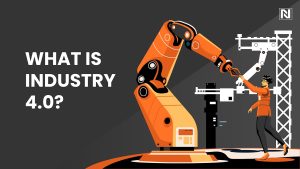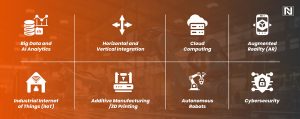
“Industry 4.0, the fourth industrial revolution, integrates digital technologies into manufacturing to produce superior products at lower costs.”
Industry 4.0 is the next big shift in how things are made and how businesses operate. It combines advanced technologies like artificial intelligence (AI), the Internet of Things (IoT), and automation to create “smart” factories where machines, systems, and data are connected and communicate seamlessly. This revolution is changing industries worldwide, making processes more efficient, reducing costs, and increasing productivity. But what does this mean for the future of work and business?
This blog will explore how Industry 4.0 transforms manufacturing and what it means for the future.
What is Industry 4.0?
Industry 4.0, also known as the Fourth Industrial Revolution or 4IR, represents a transformative shift in how computers, data, and automation intersect to revolutionize work, particularly in manufacturing.
Building on the advancements of the third industrial revolution marked by the rise of PCs and the internet, Industry 4.0 ushers in a new era where the boundaries between digital and physical realms are increasingly blurred. Technologies like automation, AI, and IoT are becoming integral to this evolution.
Unlike previous industrial revolutions, which focused primarily on technological advancements, Industry 4.0 emphasizes how these technologies reshape our daily lives and work environments.
How Does Industry 4.0 Work?
To truly grasp the concept of Industry 4.0, consider its impact on manufacturing. Here are three key examples demonstrating how Industry 4.0 can enhance manufacturing operations:

Supply Chain Management. With Industry 4.0 technologies, businesses gain enhanced insight, control, and visibility into their supply chains. This shift to smart manufacturing allows companies to deliver products and services more quickly, cost-effectively, and with superior quality.
As Industry 4.0 solutions become increasingly prevalent in supply chain management, the competitive landscape intensifies, compelling businesses to adopt these advanced strategies or risk being left behind.
Predictive Maintenance. Industry 4.0 technologies enable predictive maintenance by forecasting machinery downtime before it occurs. Unlike traditional preventive maintenance, which relies on manual routines or fixed schedules, Industry 4.0 systems use real-time data to detect potential issues early. These systems predict problems and offer insights on how to address them proactively.
Asset Tracking and Optimization. Industry 4.0 simplifies the tracking of inventory, quality, and logistics optimization. Connected manufacturing and IoT technology provide real-time visibility into assets across the globe. Tasks such as asset transfers, disposals, reclassifications, and adjustments can be efficiently managed from a central location, streamlining operations and improving overall asset management.
What are the Benefits of Industry 4.0?
Industry 4.0, also known as the Fourth Industrial Revolution, leverages digital technologies and data-driven approaches to transform manufacturing and industrial processes. Here are some key benefits of Industry 4.0:
- Smart Manufacturing
Automated systems and robotics can handle complex tasks with high precision. For example, smart factories use interconnected machines that adjust real-time operations based on data inputs, leading to more efficient production.
- Digital Twins
These virtual models of physical systems allow for real-time monitoring and simulation of processes. By testing changes in a digital environment before applying them to the real world, companies can more effectively optimize performance and troubleshoot problems.
- Customizable Production
Technologies like 3D printing and modular production systems allow for mass customization. This means products can be tailored to individual customer needs without significant cost increases or production delays.
What Are the Applications of Industry 4.0?
Industry 4.0 technologies can enhance every stage of the manufacturing process, from initial product development to the end of a product’s lifecycle. Here are some key use cases of these innovations:
- Predictive Maintenance
Integrating IIoT sensors with industrial equipment allows for continuous performance monitoring and early detection of issues that signal the need for maintenance or updates.
- Real-Time Data Collection and Analysis
IIoT devices relay real-time data to AI and machine learning platforms, where it’s analyzed to spot potential threats, failures, and opportunities for enhancing efficiency. Facilities that can process vast amounts of data and make automated decisions are referred to as smart factories.
- Supply Chain Visibility
Track goods throughout the supply chain with physical devices, cloud computing for data transmission and storage, and software dashboards that provide essential information to workers. Industry 4.0 simplifies the process of sourcing raw materials needed for manufacturing.
- Additive and Digital Manufacturing
Additive manufacturing, or 3D printing, revolutionizes prototyping and customization. It allows for digital modifications and detailed adjustments to new products, streamlining the manufacturing process.
- Inventory Management
AI and machine learning analyze purchase data to predict inventory needs, enhancing inventory management and minimizing delays.
- Augmented Reality
Augmented reality devices offer remote data and instructions to workers, facilitating operations across different facility areas. They also enhance training by simulating real-world scenarios for new hires.
- Sustainability
Industry 4.0 technologies assist in regulating power usage, reducing machinery emissions, and monitoring assets that provide sustainable energy solutions.
Did You Know?
According to Statista, In a 2022 survey in Italy, 40% of companies reported being in the pilot phase of adopting Industry 4.0 technologies, while 25% had already fully integrated these technologies into their operations.
According to Markets and Markets, The global Industry 4.0 market, valued at $52.17 billion in 2023, is projected to grow to $182.01 billion by 2028, achieving a robust CAGR of 28.4%.
Real-world Examples of Industry 4.0 Technologies
Industry 4.0 technologies are transforming various sectors by integrating digital technologies into manufacturing and industrial processes. Here are some real-world examples of these technologies in action:

- Big Data and AI Analytics
In the era of Industry 4.0, Big Data is harvested from diverse sources, including assets, machinery, and IoT devices. Beyond the factory floor, data extends to customer feedback, market trends, and weather and traffic information, enhancing logistics.
AI and machine learning process this data in real-time, providing actionable insights that refine decision-making and automation across manufacturing and supply chain operations.
- Horizontal and Vertical Integration
Industry 4.0 hinges on both horizontal and vertical integration. Horizontal integration links processes across production floors, facilities, and supply chains, ensuring seamless coordination. Vertical integration connects all organizational levels, allowing data to flow freely from the shop floor to the executive suite.
This integration harmonizes production with business functions like R&D, quality assurance, and sales, breaking down data silos and optimizing operations.
- Cloud Computing
Cloud computing serves as the backbone of Industry 4.0 and digital transformation. It underpins advanced technologies like AI, machine learning, and IoT, enabling businesses to innovate. The cloud stores the data essential for Industry 4.0 technologies and facilitates real-time communication and coordination among cyber-physical systems.
- Augmented Reality (AR)
Augmented Reality enhances the real world with digital overlays. Through AR systems, employees can use smart glasses or mobile devices to view real-time IoT data, digital components, repair instructions, and training materials while interacting with physical objects.
Although still developing, AR has significant potential for maintenance, service, quality assurance, technician training, and safety.
- Industrial Internet of Things (IIoT)
The Industrial Internet of Things (IIoT) is a cornerstone of Industry 4.0. It involves equipping physical objects such as devices, robots, and machinery with sensors and RFID tags to provide real-time data on their status, performance, or location. IIoT technology enhances supply chain efficiency, accelerates product design, reduces downtime, tracks consumer trends, and monitors inventory.
- Additive Manufacturing/3D Printing
Initially used for rapid prototyping, additive manufacturing or 3D printing now supports mass customization and decentralized production. Parts and products can be stored as virtual design files and printed on demand, minimizing costs and reducing the need for external manufacturing. 3D printing continually evolves, now including materials such as metals, advanced polymers, ceramics, and biomaterials.
- Autonomous Robots
Industry 4.0 introduces a new generation of autonomous robots designed for minimal human intervention. These robots range from inventory-scanning drones to mobile units for picking and placing. Equipped with sophisticated AI, sensors, and machine vision, they perform complex tasks, analyze environmental data, and make decisions based on their surroundings.
- Cybersecurity
Robust cybersecurity is crucial with the increased connectivity and Big Data usage in Industry 4.0. Adopting Zero Trust models and employing technologies like machine learning and blockchain enables automated threat detection and response, reducing the risk of data breaches and production interruptions across networks.
How Nirvana Can Help You With Industry 4.0
At Nirvana Lab, our state-of-the-art technology solutions facilitate your transition to Industry 4.0. We integrate IoT, AI, and cloud-based systems to optimize manufacturing, enhance automation, and improve data management. We aim to empower your business with the tools for smarter decision-making and increased operational efficiency, ensuring you lead in the digital transformation era.
Frequently Asked Questions
What is Industry 4.0?
Industry 4.0, or the Fourth Industrial Revolution, refers to integrating advanced technologies such as AI, IoT, and automation in manufacturing and business processes. It creates “smart” factories where interconnected machines and systems enhance efficiency, productivity, and decision-making.
How does Industry 4.0 improve manufacturing?
Industry 4.0 enhances manufacturing through predictive maintenance, real-time data analysis, smart manufacturing, and improved supply chain visibility. These advancements lead to reduced downtime, increased precision, and better management of resources and inventory.
What are some examples of Industry 4.0 technologies?
Examples include Big Data and AI analytics, IoT sensors, cloud computing, augmented reality (AR), additive manufacturing (3D printing), autonomous robots, and robust cybersecurity measures.
What are the benefits of adopting Industry 4.0?
Key benefits include predictive maintenance to avoid unplanned downtime, smart manufacturing for efficient production, real-time supply chain visibility, customizable production, and enhanced sustainability through optimized power usage and reduced emissions.
How can Nirvana Lab assist with Industry 4.0 implementation?
Nirvana Lab offers advanced technology solutions to facilitate your transition to Industry 4.0. We provide integration services for IoT, AI, and cloud-based systems to optimize manufacturing processes, enhance automation, and improve data management for smarter decision-making and increased efficiency.